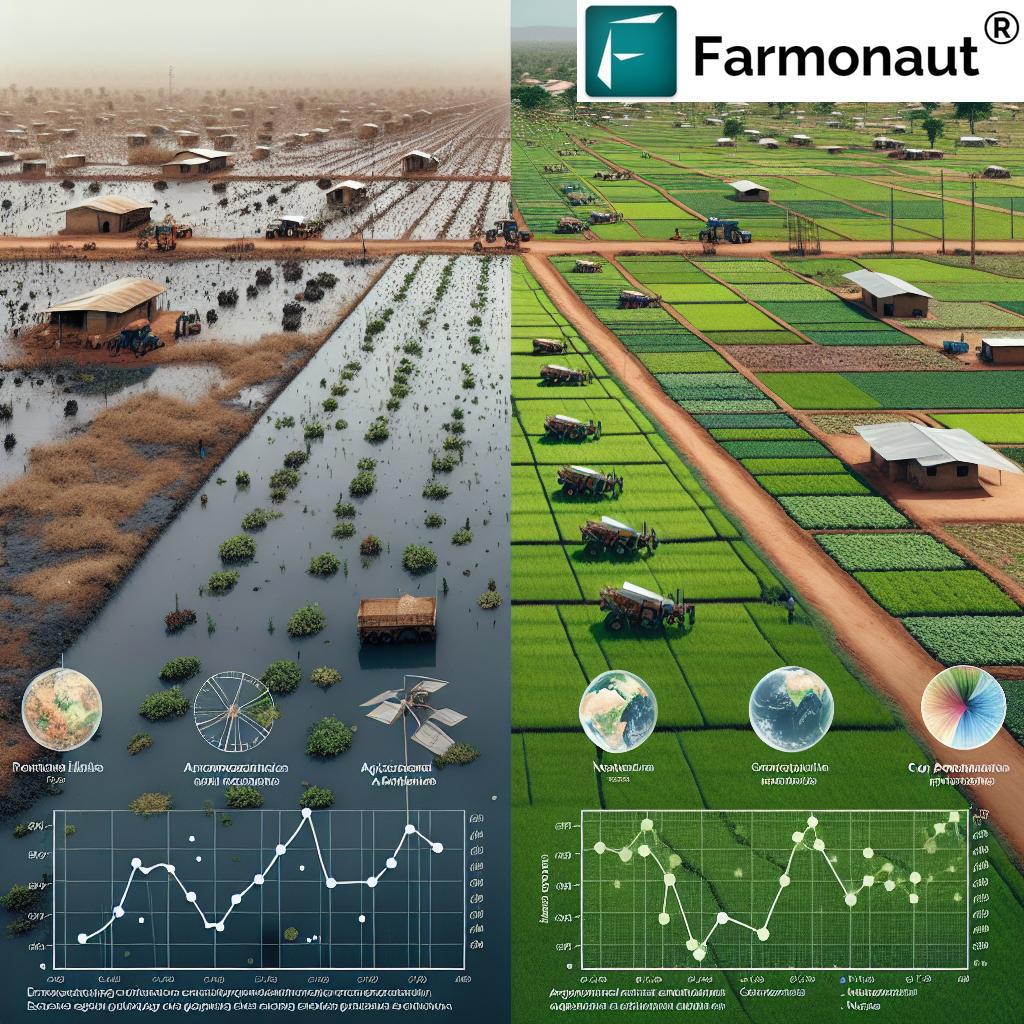Boosting Food Security in Nigeria: Nasarawa’s Agricultural Reforms Drive Economic Recovery and Sustainable Growth
“Nasarawa State’s agricultural reforms focus on rice production, aiming to boost crop yields by implementing advanced irrigation technology.”
In the heart of Nigeria, a revolution is taking place. Nasarawa State, often referred to as the “Home of Solid Minerals,” is now emerging as a beacon of hope for the country’s agricultural sector. We are witnessing a transformation that promises not only to boost food security but also to drive economic recovery and sustainable growth across the nation. As we delve into the latest developments in Nigeria’s agricultural landscape, we’ll explore how innovative approaches and government support are shaping the future of farming in Nasarawa and beyond.
The Dawn of Agricultural Reforms in Nigeria
Nigeria, Africa’s most populous country, has long recognized the potential of its agricultural sector. However, recent events have brought this potential into sharp focus. The Nigerian government, under the leadership of President Bola Ahmed Tinubu, has initiated a series of agricultural reforms in Nigeria aimed at revitalizing the sector and ensuring food security for its growing population.
At the forefront of these reforms is Nasarawa State, where Governor Abdullahi Sule’s administration has embarked on an ambitious journey to transform the state’s agricultural landscape. The recent visit by Vice President Kashim Shettima to Nasarawa underscored the federal government’s commitment to supporting these initiatives, marking a new era of collaboration between federal and state authorities in the pursuit of agricultural excellence.

Nasarawa: A Model for Sustainable Agriculture Growth
Nasarawa State’s approach to agricultural development is multifaceted, focusing on several key areas:
- Rice Production: The state has placed a significant emphasis on boosting rice production, recognizing its importance as a staple food and its potential for economic growth.
- Irrigation Technology: Implementing advanced irrigation systems to improve crop yields and mitigate the effects of unpredictable weather patterns.
- Investment in Agribusiness: The establishment of a one-stop investment center aims to attract both domestic and foreign investment in the agricultural sector.
- Vocational Training: Programs designed to equip farmers with modern agricultural techniques and business skills.
These initiatives are not just about increasing food production; they represent a holistic approach to sustainable agriculture growth that considers environmental impact, economic viability, and social equity.
The Role of Technology in Agricultural Transformation
In the digital age, technology plays a crucial role in revolutionizing traditional farming practices. Nasarawa’s agricultural reforms have embraced this reality, incorporating agritech solutions to address various challenges, particularly in flood-affected areas.
One of the most promising technologies in this regard is satellite-based crop monitoring. Companies like Farmonaut are at the forefront of this revolution, offering farmers data-driven insights to optimize their practices. Through its advanced platform, Farmonaut provides real-time information on crop health, soil moisture levels, and weather patterns, enabling farmers to make informed decisions about irrigation, fertilization, and pest control.
Irrigation Technology: A Game-Changer for Crop Yields
One of the most significant aspects of Nasarawa’s agricultural reforms is the focus on irrigation technology for crop yield improvement. Traditional rain-fed agriculture is no longer sufficient to meet the demands of a growing population, especially in the face of climate change. By investing in modern irrigation systems, Nasarawa is taking a proactive approach to ensure consistent crop yields throughout the year.
The benefits of improved irrigation are manifold:
- Increased crop yields and quality
- Extended growing seasons
- Reduced water waste
- Mitigation of drought impacts
- Diversification of crop types
These advancements in irrigation are particularly crucial for rice production, which is water-intensive. By optimizing water usage, Nasarawa is not only boosting productivity but also contributing to environmental sustainability.
Economic Recovery Through Farming: A New Paradigm
The emphasis on agricultural development in Nasarawa is not just about food security; it’s a cornerstone of the state’s strategy for economic recovery through farming. By positioning agriculture as a key driver of economic growth, Nasarawa is creating a model that could be replicated across Nigeria.
This approach is multifaceted:
- Job Creation: The agricultural sector has the potential to absorb a significant portion of Nigeria’s unemployed workforce.
- Export Opportunities: Increased production, particularly in rice, opens up new export possibilities, diversifying Nigeria’s economy beyond oil.
- Rural Development: Investment in agriculture leads to improved infrastructure and services in rural areas, reducing urban migration.
- Industrial Growth: A thriving agricultural sector supports the growth of agro-allied industries, creating a multiplier effect on the economy.
“Nigeria’s one-stop investment center for agribusiness is expected to attract significant capital, potentially increasing agricultural GDP by 20% in 5 years.”
The One-Stop Investment Center: Catalyzing Agribusiness Growth
The establishment of the one-stop investment center for agribusiness in Nasarawa is a game-changing initiative. This center aims to streamline the process for investors looking to enter the agricultural sector, providing a single point of contact for all necessary permits, licenses, and information.
Key features of the investment center include:
- Simplified registration processes for agribusinesses
- Access to information on land availability and acquisition
- Guidance on relevant agricultural policies and incentives
- Facilitation of partnerships between local farmers and investors
- Support for accessing agricultural financing and grants
This initiative is expected to significantly boost investment in agricultural development, attracting both domestic and foreign capital to the sector.

Vocational Training: Empowering the Next Generation of Farmers
A crucial component of Nasarawa’s agricultural revolution is the emphasis on vocational training in agriculture. The Wing Commander Abdullahi Ibrahim Vocational Training Centre is at the forefront of this initiative, providing comprehensive training programs for aspiring farmers and agribusiness entrepreneurs.
These training programs cover a wide range of topics:
- Modern farming techniques and best practices
- Use of agricultural technology and machinery
- Crop management and pest control
- Agribusiness management and financial literacy
- Sustainable farming practices and environmental conservation
By equipping the next generation of farmers with these skills, Nasarawa is laying the foundation for long-term agricultural sustainability and growth.
Addressing Food Security Challenges in Flood-Affected Areas
One of the most pressing challenges facing Nigerian agriculture is the impact of flooding on crop production. Nasarawa’s agricultural reforms include specific agritech solutions for flood-affected areas, demonstrating a proactive approach to this perennial issue.
Key strategies include:
- Implementation of flood-resistant crop varieties
- Development of improved drainage systems
- Use of satellite technology for early flood detection and warning
- Provision of emergency agricultural inputs to affected farmers
- Training on flood-adaptive farming techniques
These measures not only help in mitigating the immediate impact of floods but also contribute to long-term resilience in the face of climate change.
The Impact of Agricultural Reforms: A Data-Driven Perspective
To truly understand the impact of Nasarawa’s agricultural reforms, it’s essential to look at the data. The following table provides a comparative analysis of key agricultural indicators before and after the implementation of reforms:
| Indicator | Pre-Reform (Estimated) | Post-Reform (Estimated) |
|---|---|---|
| Annual Rice Production (tons) | 100,000 | 250,000 |
| Irrigation Coverage (hectares) | 5,000 | 15,000 |
| Agribusiness Investments (USD millions) | 20 | 100 |
| Farmer Training Programs (annual participants) | 1,000 | 5,000 |
| Crop Yield Improvement (%) | – | 30% |
These figures demonstrate the significant strides made in various aspects of agriculture, from production capacity to human capital development.
The Role of Farmonaut in Supporting Agricultural Reforms
In the context of Nasarawa’s agricultural transformation, technologies like those offered by Farmonaut play a crucial role. Farmonaut’s satellite-based crop monitoring system provides valuable insights that can help farmers and policymakers alike in making informed decisions.
Key benefits of Farmonaut’s technology include:
- Real-time crop health monitoring
- Precise soil moisture analysis
- Early detection of pest and disease outbreaks
- Optimization of resource use (water, fertilizers)
- Data-driven yield predictions
By leveraging these technologies, Nasarawa can enhance the effectiveness of its agricultural reforms, ensuring that interventions are targeted and impactful.
Challenges and Future Prospects
While the agricultural reforms in Nasarawa have shown promising results, several challenges remain:
- Infrastructure Development: Continued investment in rural infrastructure is needed to support agricultural growth.
- Climate Change Adaptation: Developing strategies to mitigate the impacts of changing weather patterns on agriculture.
- Market Access: Improving transportation and storage facilities to reduce post-harvest losses and enhance market access for farmers.
- Technology Adoption: Encouraging widespread adoption of agricultural technologies among smallholder farmers.
- Sustainable Practices: Balancing increased production with environmental conservation.
Addressing these challenges will be crucial for the long-term success of Nasarawa’s agricultural transformation and its contribution to Nigeria’s food security and economic growth.
Conclusion: A Model for National Agricultural Development
Nasarawa’s agricultural reforms represent a blueprint for sustainable agricultural development in Nigeria. By focusing on key areas such as rice production, irrigation technology, investment in agribusiness, and vocational training, the state is not only addressing immediate food security concerns but also laying the groundwork for long-term economic growth and sustainability.
The success of these initiatives demonstrates the potential of agriculture to drive economic recovery and create opportunities for millions of Nigerians. As other states look to Nasarawa’s model, there is hope that Nigeria can harness its vast agricultural potential to become a food-secure nation and a major player in the global agricultural market.
The journey towards agricultural transformation is ongoing, but with continued commitment from government, innovative technologies, and the dedication of Nigerian farmers, the future of agriculture in Nasarawa and Nigeria as a whole looks brighter than ever.
FAQs
- What are the main goals of Nasarawa’s agricultural reforms?
The main goals include boosting food security, driving economic recovery, increasing rice production, implementing advanced irrigation technology, attracting investments in agribusiness, and providing vocational training in agriculture. - How is technology being used to support agricultural development in Nasarawa?
Technology is being used through satellite-based crop monitoring systems, advanced irrigation techniques, and agritech solutions for flood-affected areas. Companies like Farmonaut provide data-driven insights to optimize farming practices. - What is the significance of the one-stop investment center for agribusiness?
The one-stop investment center streamlines the process for investors entering the agricultural sector, providing a single point of contact for permits, licenses, and information, thereby attracting more investment to the sector. - How are the agricultural reforms addressing the challenge of flooding?
The reforms include implementing flood-resistant crop varieties, improving drainage systems, using satellite technology for early flood detection, providing emergency agricultural inputs, and training farmers on flood-adaptive techniques. - What role does vocational training play in Nasarawa’s agricultural development?
Vocational training programs equip aspiring farmers and agribusiness entrepreneurs with modern farming techniques, technology skills, crop management knowledge, and business acumen, laying the foundation for long-term agricultural sustainability.
















